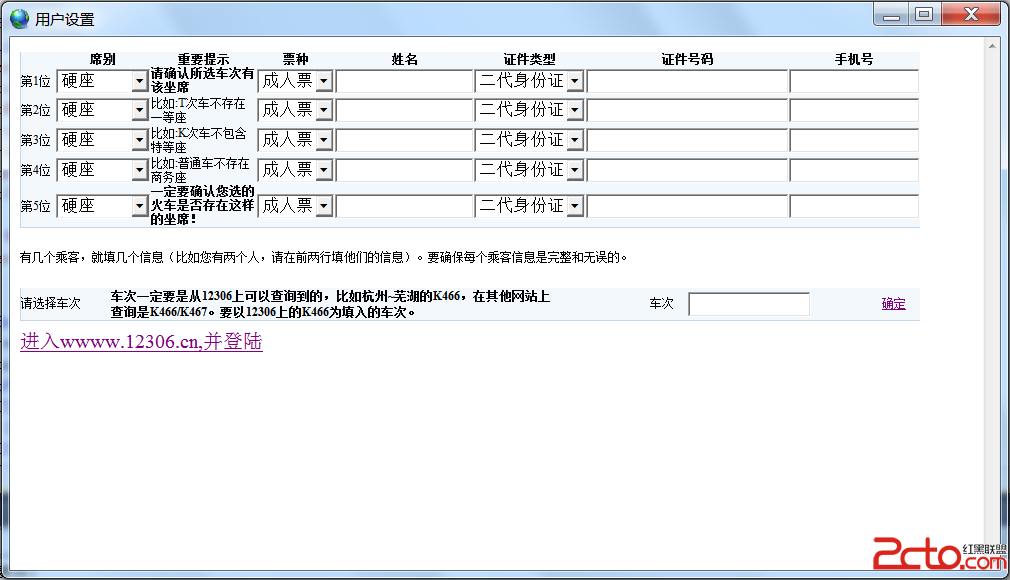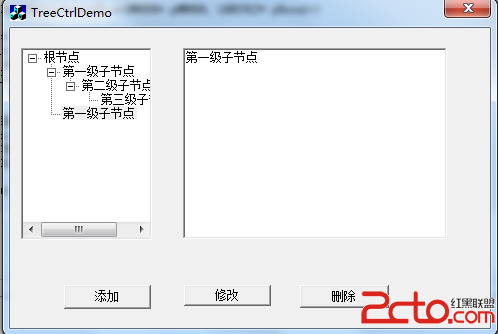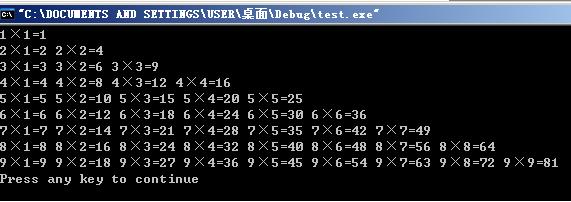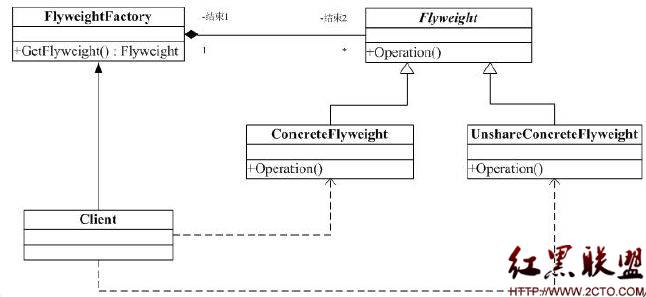实现一个简单的栈,并非难事,但是使用C语言编写一个GenericStack还是有挑战.本文使用自增长数组的方式实现栈.同样遵循上篇("genericlist篇")所写的C语言泛型设计的原则,再次不赘述.
模型
------------------------------------------------------------------------------------------------------------------------
核心代码
------------------------------------------------------------------------------------------------------------------------
完整代码详见我的github(https://github.com/gnudennis/ds_c)(genric-stack.h generic-stack.c generic-stack-test.c)
0. Generic Stack定义
[cpp]
typedef void *ElementAddr;
typedef void (*PfCbFree)(ElementAddr);
typedef struct StackRecord
{
ElementAddr *array;
int elemsize;
int loglength;
int alloclength;
PfCbFree freefn;
} *Stack;
1. API的设计
[cpp]
/* Create a new stack */
Stack stack_create(int elemsize, PfCbFree freefn);
/* Dispose the stack */
void stack_dispose(Stack stk);
/* Make the given stack empty */
void stack_make_empty(Stack stk);
/* Return true if the stack is empty */
int stack_is_empty(Stack stk);
/* Insert a new element onto stack */
void stack_push(Stack stk, ElementAddr elemaddr);
/* Delete the top element off the stack */
void stack_pop(Stack stk);
/* Fetch the top element from the stack */
void stack_top(Stack stk, ElementAddr elemaddr);
/* Fetch & Delete the top element from the stack */
void stack_top_and_pop(Stack stk, ElementAddr elemaddr);
将pop和top分开的目的是为了满足不同的需求,同时添加了stack_top_and_pop作为补充.
2.实现
[cpp]
#define MIN_STACK_SIZE (4)
/* Create a new stack */
Stack
stack_create(int elemsize, PfCbFree freefn)
{
Stack stk;
stk = malloc(sizeof(struct StackRecord));
if ( stk == NULL) {
fprintf(stderr, "Out of memory\n");
exit(1);
}
stk->array = malloc(elemsize * MIN_STACK_SIZE);
if (stk->array == NULL) {
fprintf(stderr, "Out of memory\n");
exit(1);
}
stk->elemsize = elemsize;
stk->loglength = 0;
stk->alloclength = MIN_STACK_SIZE;
}
/* Dispose the stack*/
void
stack_dispose(Stack stk)
{
stack_make_empty(stk);
free(stk->array);
free(stk);
}
/* Make the given stack empty*/
void
stack_make_empty(Stack stk)
{
if ( stk->freefn ) {
int i;
for ( i = 0; i < stk->loglength; ++i) {
stk->freefn((char *)stk->array +
i * stk->elemsize);
}
}
stk->loglength = 0;
}
/* Return true if the stack is empty*/
int
stack_is_empty(Stack stk)
{
return stk->loglength == 0;
}
static void
stack_grow(Stack stk)
{
stk->alloclength *= 2;
stk->array = realloc(stk->array,
stk->alloclength * stk->elemsize);
}
/* Insert a new element onto stack */
void
stack_push(Stack stk, ElementAddr elemaddr)
{
ElementAddr target;
if ( stk->loglength == stk->alloclength )
stack_grow(stk);
target = (char *)stk->array + stk->loglength * stk->elemsize;
memcpy(target, elemaddr, stk->elemsize);
stk->loglength++;
}
/* Delete the top element off the stack */
void
stack_pop(Stack stk)
{
ElementAddr target;
if ( stack_is_empty(stk) ) {
fprintf(stderr, "Empty stack\n");
exit(1);
}
if ( stk->freefn ) {
target = (char *)stk->array +
(stk->loglength-1) * stk->elemsize;
stk->freefn(target);
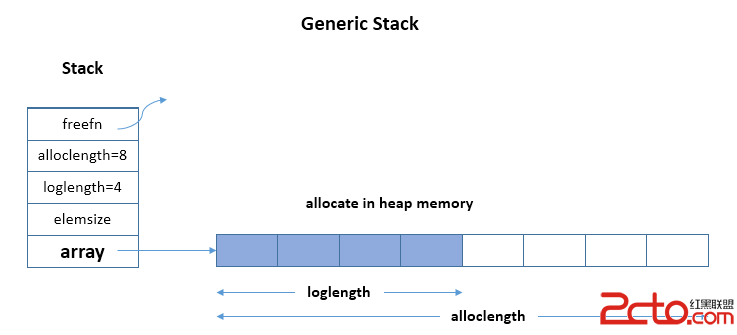 核心代码
------------------------------------------------------------------------------------------------------------------------
完整代码详见我的github(https://github.com/gnudennis/ds_c)(genric-stack.h generic-stack.c generic-stack-test.c)
0. Generic Stack定义
[cpp]
typedef void *ElementAddr;
typedef void (*PfCbFree)(ElementAddr);
typedef struct StackRecord
{
ElementAddr *array;
int elemsize;
int loglength;
int alloclength;
PfCbFree freefn;
} *Stack;
1. API的设计
[cpp]
/* Create a new stack */
Stack stack_create(int elemsize, PfCbFree freefn);
/* Dispose the stack */
void stack_dispose(Stack stk);
/* Make the given stack empty */
void stack_make_empty(Stack stk);
/* Return true if the stack is empty */
int stack_is_empty(Stack stk);
/* Insert a new element onto stack */
void stack_push(Stack stk, ElementAddr elemaddr);
/* Delete the top element off the stack */
void stack_pop(Stack stk);
/* Fetch the top element from the stack */
void stack_top(Stack stk, ElementAddr elemaddr);
/* Fetch & Delete the top element from the stack */
void stack_top_and_pop(Stack stk, ElementAddr elemaddr);
将pop和top分开的目的是为了满足不同的需求,同时添加了stack_top_and_pop作为补充.
2.实现
[cpp]
#define MIN_STACK_SIZE (4)
/* Create a new stack */
Stack
stack_create(int elemsize, PfCbFree freefn)
{
Stack stk;
stk = malloc(sizeof(struct StackRecord));
if ( stk == NULL) {
fprintf(stderr, "Out of memory\n");
exit(1);
}
stk->array = malloc(elemsize * MIN_STACK_SIZE);
if (stk->array == NULL) {
fprintf(stderr, "Out of memory\n");
exit(1);
}
stk->elemsize = elemsize;
stk->loglength = 0;
stk->alloclength = MIN_STACK_SIZE;
}
/* Dispose the stack*/
void
stack_dispose(Stack stk)
{
stack_make_empty(stk);
free(stk->array);
free(stk);
}
/* Make the given stack empty*/
void
stack_make_empty(Stack stk)
{
if ( stk->freefn ) {
int i;
for ( i = 0; i < stk->loglength; ++i) {
stk->freefn((char *)stk->array +
i * stk->elemsize);
}
}
stk->loglength = 0;
}
/* Return true if the stack is empty*/
int
stack_is_empty(Stack stk)
{
return stk->loglength == 0;
}
static void
stack_grow(Stack stk)
{
stk->alloclength *= 2;
stk->array = realloc(stk->array,
stk->alloclength * stk->elemsize);
}
/* Insert a new element onto stack */
void
stack_push(Stack stk, ElementAddr elemaddr)
{
ElementAddr target;
if ( stk->loglength == stk->alloclength )
stack_grow(stk);
target = (char *)stk->array + stk->loglength * stk->elemsize;
memcpy(target, elemaddr, stk->elemsize);
stk->loglength++;
}
/* Delete the top element off the stack */
void
stack_pop(Stack stk)
{
ElementAddr target;
if ( stack_is_empty(stk) ) {
fprintf(stderr, "Empty stack\n");
exit(1);
}
if ( stk->freefn ) {
target = (char *)stk->array +
(stk->loglength-1) * stk->elemsize;
stk->freefn(target);
核心代码
------------------------------------------------------------------------------------------------------------------------
完整代码详见我的github(https://github.com/gnudennis/ds_c)(genric-stack.h generic-stack.c generic-stack-test.c)
0. Generic Stack定义
[cpp]
typedef void *ElementAddr;
typedef void (*PfCbFree)(ElementAddr);
typedef struct StackRecord
{
ElementAddr *array;
int elemsize;
int loglength;
int alloclength;
PfCbFree freefn;
} *Stack;
1. API的设计
[cpp]
/* Create a new stack */
Stack stack_create(int elemsize, PfCbFree freefn);
/* Dispose the stack */
void stack_dispose(Stack stk);
/* Make the given stack empty */
void stack_make_empty(Stack stk);
/* Return true if the stack is empty */
int stack_is_empty(Stack stk);
/* Insert a new element onto stack */
void stack_push(Stack stk, ElementAddr elemaddr);
/* Delete the top element off the stack */
void stack_pop(Stack stk);
/* Fetch the top element from the stack */
void stack_top(Stack stk, ElementAddr elemaddr);
/* Fetch & Delete the top element from the stack */
void stack_top_and_pop(Stack stk, ElementAddr elemaddr);
将pop和top分开的目的是为了满足不同的需求,同时添加了stack_top_and_pop作为补充.
2.实现
[cpp]
#define MIN_STACK_SIZE (4)
/* Create a new stack */
Stack
stack_create(int elemsize, PfCbFree freefn)
{
Stack stk;
stk = malloc(sizeof(struct StackRecord));
if ( stk == NULL) {
fprintf(stderr, "Out of memory\n");
exit(1);
}
stk->array = malloc(elemsize * MIN_STACK_SIZE);
if (stk->array == NULL) {
fprintf(stderr, "Out of memory\n");
exit(1);
}
stk->elemsize = elemsize;
stk->loglength = 0;
stk->alloclength = MIN_STACK_SIZE;
}
/* Dispose the stack*/
void
stack_dispose(Stack stk)
{
stack_make_empty(stk);
free(stk->array);
free(stk);
}
/* Make the given stack empty*/
void
stack_make_empty(Stack stk)
{
if ( stk->freefn ) {
int i;
for ( i = 0; i < stk->loglength; ++i) {
stk->freefn((char *)stk->array +
i * stk->elemsize);
}
}
stk->loglength = 0;
}
/* Return true if the stack is empty*/
int
stack_is_empty(Stack stk)
{
return stk->loglength == 0;
}
static void
stack_grow(Stack stk)
{
stk->alloclength *= 2;
stk->array = realloc(stk->array,
stk->alloclength * stk->elemsize);
}
/* Insert a new element onto stack */
void
stack_push(Stack stk, ElementAddr elemaddr)
{
ElementAddr target;
if ( stk->loglength == stk->alloclength )
stack_grow(stk);
target = (char *)stk->array + stk->loglength * stk->elemsize;
memcpy(target, elemaddr, stk->elemsize);
stk->loglength++;
}
/* Delete the top element off the stack */
void
stack_pop(Stack stk)
{
ElementAddr target;
if ( stack_is_empty(stk) ) {
fprintf(stderr, "Empty stack\n");
exit(1);
}
if ( stk->freefn ) {
target = (char *)stk->array +
(stk->loglength-1) * stk->elemsize;
stk->freefn(target);
